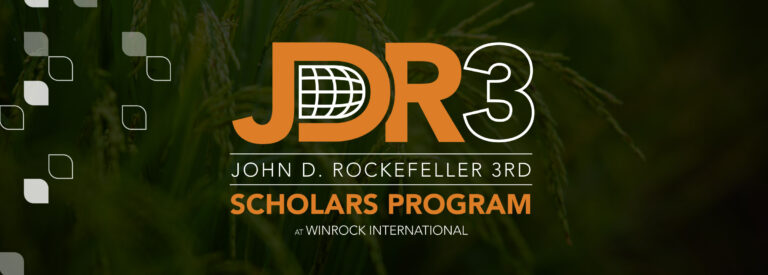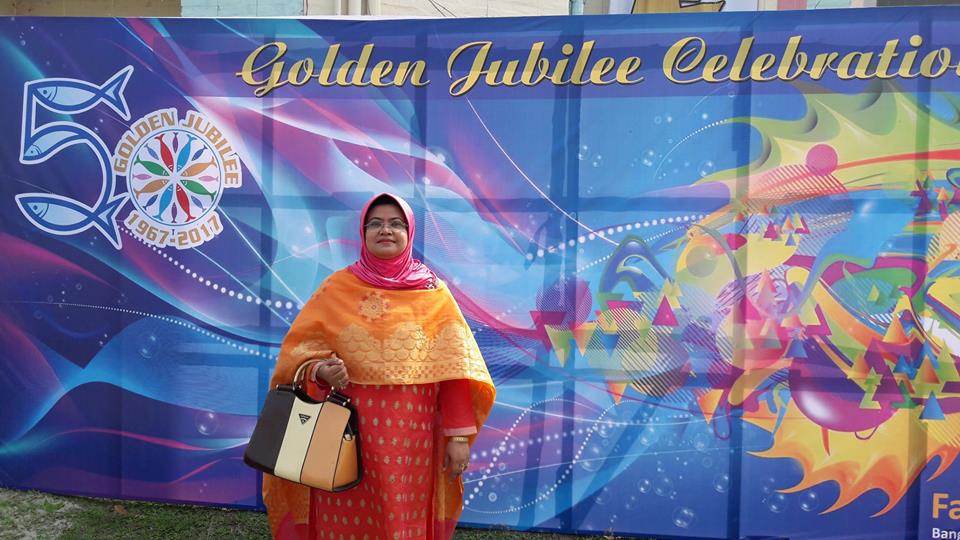
JDR3 Spotlight: Kaniz Fatema
Can you tell us a bit about yourself — where you come from and how you came to work in your current field?
Hello, I am Ms. Kaniz Fatema, born in Rangpur, in the northern part of Bangladesh. I have completed a Secondary School Certificate (SSC) and Higher Secondary School Certificate (HSC) from Rangpur in the science group with a first division in both. Then I was admitted to Bangladesh Agricultural University (BAU), Mymensingh, in the Faculty of Fisheries from where I have completed the B.Sc. Fisheries (Hons.) degree and secured First Class Second position among all students. Then I received a Master of Science (M.S.) degree in the Department of Fisheries Management, BAU, and secured First Class First position among all students. Based on my outstanding academic background I got the opportunity to be a lecturer in the Department of Fisheries Management during my M.S. study. After successfully completing my M.S. degree I went to Ehime University, Japan, for Ph.D. study. I have completed Ph.D. successfully in 2009 and returned to BAU to resume my teaching and research activities.
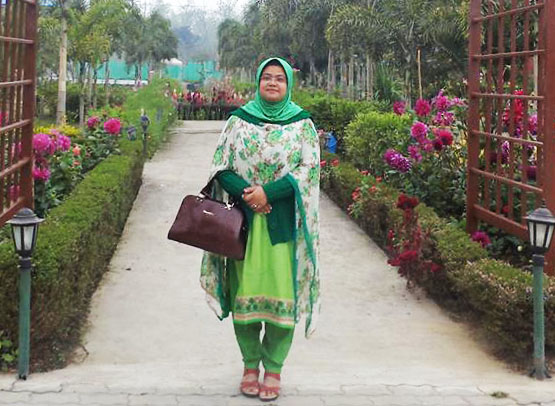
What is your current job? Can you provide a very brief overview of the duties/responsibilities involved in this position?
Currently I am serving as a professor in the Department of Fisheries Management, teaching at undergraduate and postgraduate levels. I have supervised 25 M.S. students and am currently supervising 10 M.S. and three Ph.D. students. Simultaneously, I am doing research in collaboration with national and international donor agencies and presenting my research findings at different national and international conferences.
What are your best memories from conducting the research?
I visited different parts of Bangladesh for research, data collection and personal observation. In Bangladesh, women are still far behind men in selling fish in the commercial market. Women can sell fish only from the pond side but not in the commercial fish market. My best memories are when I spoke with a women fisher who was directly involved in fish marketing in a commercial fish market.
What do you think were the biggest challenges in the study? What were the biggest successes?
The biggest challenge is the funding. When it’s available (both locally and internationally), it is very convenient to conduct the research smoothly. Another big challenge is the continuity of funding. In the case of an in-depth study, continuous support is important. Without funding, it is almost impossible to carry out of any kind of research.
The biggest success was the smiling faces of our fishers and their families. We have motivated and earned their trust by the activities of our women’s empowerment program. Now, fishermen respect and support their wives, and the women understand their self-respect and power to help their husbands in every situation of life.
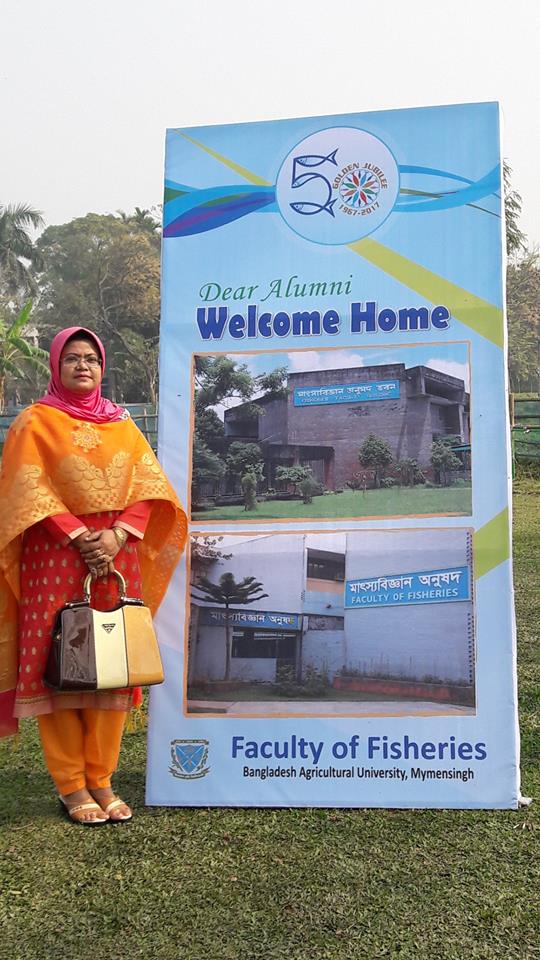
How do you think the JDR3 research study helped you with your research skills?
JDR3 research definitely helped me upgrade my research skills. I have worked with Hail Haor and Kawadighi Haor in northeast Bangladesh during 2015-2016, comparing biophysical and socioeconomic outcomes in two examples of traditionally leased (private fisheries management) public water bodies in Kawadighi Haor. There was one water body where community-based co-management had been adopted and another water body under private management within the large co-managed wetland of Hail Haor. The result of this study helped me to understand that, compared to private leaseholders, communities responsible for water bodies under co-management adopt more ecologically based management, resulting in greater sustainability of resources and secure rights and access for poor fishers. Co-management also resulted in a more equitable distribution of benefits than did private management. All these practical experiences made me understand the practical situation of the Haor fishermen and the policy of Haor management in Bangladesh.
How do you think the JDR3 experience helped you communicate your research studies to policymakers? Have you utilized these skills after the completion of the JDR3 study? Please provide examples.
Yes, the JDR3 experience helped us communicate to policymakers of the Bangladesh government. We have presented all of our research findings in front of policymakers of the Bangladesh government in a national workshop held in Dhaka. We have prepared a documentary entitled ‘A Tale of Two Wetlands’ to provide audio-visual evidence of these management approaches through the views of the wetland resource user community, local governments, local administrations and experts. The study team also explored policy avenues to institutionalize the co-management approach through rigorous review of the existing policies and legislations related to wetland management in Bangladesh.
What impact on policy do you think your research has made? Please be specific.
The policy research reviewed and examined the existing policy approaches to wetland management in Bangladesh and identified gaps and scope in the existing policy, legal and institutional frameworks with a view to institutionalize the co-management approach. Initially, it scrutinized the broader policy frameworks related to wetland management in Bangladesh and thereafter, it examined the Jolmohal Management Policy 2009 with some specific indicators such as natural-resource management approaches, social-ecological benefits, fishers’ access and social-ecological benefit-sharing mechanisms, institutional capacity for resource management, community participation in the decision-making process, and transparency and accountability. The study found that the Bangladesh Wetland Policy (2009) is focused more on generating revenue, lacks sufficient guidelines on collaborative participatory governance and eventually promotes a traditional leasing model, which is short-term and highly susceptible to elite capture. Based on the comparative analysis on water body management under co-management and under the private management system and policy gap assessment, the study further provided a set of recommendations for the sustainable wetland resource management of the country, which also has significance in the present global context. Recommended policies are:
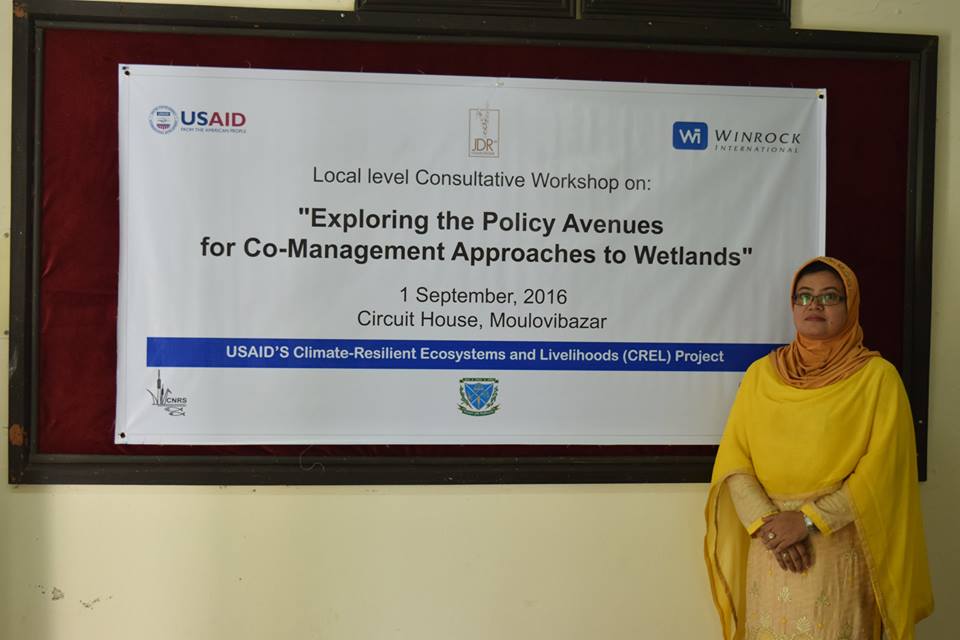
Long-term strategy:
- The government should remove the inconsistencies identified in this study from the existing sectoral legislations and policies related to wetland management in Bangladesh and establish integrated and coordinated legal, policy and institutional frameworks for sustainable wetland resource management.
- A comprehensive study is required to further develop a strategy to remove the inconsistencies from the existing sectoral legislations and policies related to wetland management in Bangladesh and to develop a policy advocacy plan to incorporate provisions on the basic elements of the community-based co-management approach to resource management, including community access to resources, community participation in the decision-making processes, and secure benefits for local communities in all sectoral legislations and policies.
Short-term strategy:
The government should take initiative for an amendment of the Jalmohal Management Policy, 2009 to incorporate substantive and procedural provisions as follows:
Substantive Provisions:
- Recognition of collaborative (co-) management approach
- Guidelines for lease organizations regarding:
1. sustainable resource management
2. access and use rights of fishers
3. distribution of socio-ecological benefits - Clear guidance on design, conditions for, and implementation of development projects in Jalmohal
- Guidelines for performance assessment of lease organizations
- Guidelines for imposing sanctions on leaseholders when they adopt destructive practices affecting fish, wildlife or wetland ecosystems, or break the terms of their lease or development project
- Stronger coordination and integration among the relevant institutions and stakeholders
- Guidelines for sustainable resource management during the Khas collection process
- Limits on lease values
Procedural Mechanisms:
- Increase transparency and accountability (e.g. making public the decisions of Jalmohal Management Committees)
- More effective civil society and community participation in decision-making
- Legislative approach to provide a framework within which the Jalmohal policy, 2009 and rules adopted thereunder can be operated with an effective institutional framework
Have you been able to secure more funding for your research (in this area or other related areas) after the JDR3 study? How many publications (i.e. books, peer-reviewed papers) have you published after the JDR3 study in this area of research and other topics?
Yes, I received a grant for other research, but I did not receive any further funding for the research that was funded by JDR. I have been working on open-water fisheries research in other water bodies of Bangladesh, such as rivers, beels, etc.
We have prepared a manuscript from the JDR3 study and it is in-process for publication.

What are you most proud of in your career? How do you think the JDR3 experience has helped you with your professional career?
I am proud of being a teacher as well as researcher in the field of fisheries science. I love to teach my beloved students about different areas of fisheries sciences. My students will be future team leaders in various areas of the fisheries sector as upazila fisheries officers, scientific officer in the Bangladesh Fisheries Research Institute, and scientific officer in the Bangladesh Fisheries Development Corporation. And I do respect and love fishermen. I feel proud when I work with fishermen closely. They are very simple, honest and friendly. They are very poor, they do not have many material possessions but they have smiles on their faces all the time. They are very happy if they can eat a meal three times a day. We must help them at any cost.
My professional career is always enriched with the research experience. JDR3 definitely helped me to upgrade my practical knowledge and expertise.
How would your life have been different without the JDR3 research experience?
Without the JDR3 experience, it might not have been possible for me to work with Haor fishermen and the wetland management of Bangladesh. I am sincerely thankful to JDR3 for giving us an opportunity to work with wetlands, where I have learned not only about Haor fishermen’s livelihoods but also Haor management policy, gap, constraints and future recommendations for the betterment of Bangladesh’s wetland management.
How have you given back to your country and your field with this research? What has it meant to the larger world?
As I am an expert of Fisheries Management, I am continuing my research in open-water fisheries management. I am doing some research with Old Brahmaputra river, Dingapota Haor, etcs for the betterment of fish species diversity as well as the socioeconomic and livelihood improvement of fishermen. The JDR3 experience inspired me to understand in depth the wetland management policy.
We have provided some long-term and short-term policy recommendations for sustainable wetland management, which has significance for not only Bangladesh but for the entire globe.
Do you have any suggestions/recommendations for future JDR3 researchers and/or the JDR3 management team/Winrock?
Our policy gap assessment identifies that policy reform is needed to institutionalize the co-management approach for sustainable wetland management in Bangladesh. A further comprehensive initiative is needed to reform the relevant policies and legislations to institutionalize the co-management approach for sustainable wetland management in Bangladesh based on the recommendations we provided.
Importantly, JDR should think about the continuation of the research on similar issues. Therefore, the research funds as well as the duration of the research need to be extended for a couple of years — or a new research idea on wetland management could be started with the same JDR3 research team of scholars to produce more in-depth information.
Related Projects
